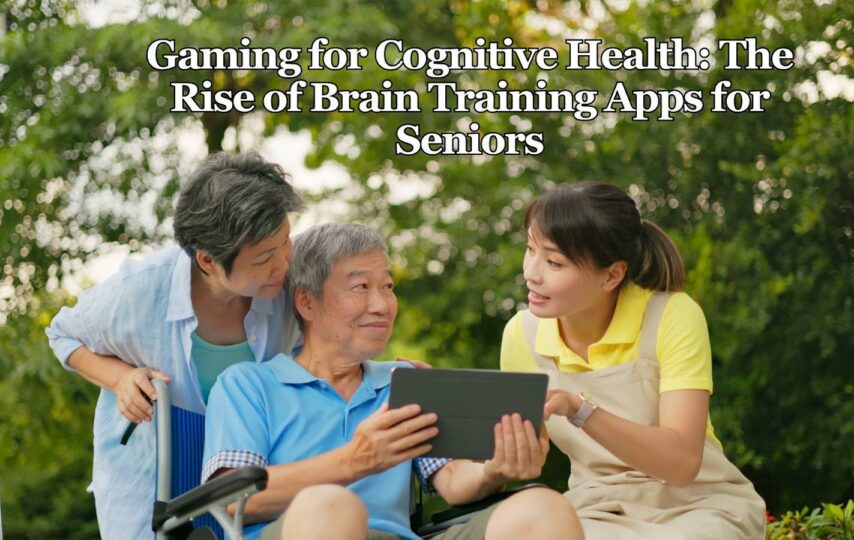Much like physical activity strengthens aging bodies, regular brain stimulation through games and activities boosts cognitive health. Tailored mental fitness gaming and training leverage neuroplasticity to help aging minds stay sharp. Let’s explore their components and impacts on well-being.
Neurological Fitness Gaming
Specialized games provide mental exercise by challenging abilities like memory, decision-making, and focus. Their enjoyable format increases participation. Easy app access allows frequent brain training from home to build skills over time. It’s also crucial to consult with the best primary care doctor for overall health maintenance.
Regular mental workouts can help maintain cognitive abilities. Activities requiring concentration, flexibility, and problem-solving “exercise” thought processes. Just as physical workouts benefit the body, mental stimulation benefits the brain.
Some natural mental decline comes with age. However, brain-stimulating activities can counteract these effects somewhat and preserve mental acuity into later years. Similar to muscles, keeping the brain active seems to maintain mental fitness.
Some examples of beneficial mental acuity exercises and activities include:
- Puzzles such as crosswords, sudoku, jigsaw puzzles and word searches
- Memory and concentration games
- Learning new skills like a language, instrument, complex hobby
- Strategy games such as chess, bridge, mahjong, and backgammon
- Visualization and creativity exercises
- Logic and reasoning problem sets and puzzles
- Brain training phone/computer apps and programs
- Mnemonic memory training and memory palace practice
- Speed reading drills
- Working memory challenges and dual n-back training
Incorporating mental workouts into one’s routine can sustain sharp thinking long-term. As with physical activity, consistency compounds cognitive benefits over time, counteracting age-related decline. Even as we get chronologically older, keeping the brain challenged can preserve mental agility.
Memory Improvement Apps
Digital memory improvement programs use progressive games that directly target retaining visual or verbal information. They hone concentration and pattern recognition through interactivity. Adaptivity also personalizes difficulty to motivate and push individual capacities.
Senior-Friendly Brain Games
Games designed specifically for seniors aim for intuitive gameplay with adjustable stimulation levels. These games for seniors avoid being too complicated or too quick. Instead, they have clear pictures, directions, and objectives, so seniors can understand and enjoy the games more easily.
They also let players customize the speed and challenge. This way, seniors with varying mental abilities can train their fluid intelligence, which involves coordinating thinking and slowing down with aging. Adapting challenge levels helps individuals with different abilities maintain or sharpen their skills through play.
Overall, senior games recognize age-related slowing in processing speed and working memory. By optimizing for comprehension, learnability, and adjustability, they maintain appropriate demands and enjoyment for the demographic. Keeping seniors engaged and challenged supports brain health and function at different functional levels. Intuitive design opens up cognitive gaming benefits to diverse senior abilities. Maintaining engagement and challenge supports senior brain health and function.
Cognitive Fitness Challenges
Specialized mental workout regimens incorporate a series of cognitive activities that systematically increase in difficulty and demand. These build skills and neural flexibility in ways that push and elevate brain functioning above baseline rates.
Cognitive challenges include components like:
- Goal setting to motivate reaching higher tiers
- Benchmarking to track progress
- Timed tasks to spark urgency
- Points systems for achievement rewards
- Problem-solving puzzles requiring critical thinking
- Memory games need focus and accuracy
- Processing speed drills to sharpen reflexes
- Attention filters for distraction resistance
- Logic tests measure reasoning abilities
Such mental boot camps limit frustrations by structuring progressive challenge tiers to support adherence. Initial levels establish fundamentals, while later stages stretch capacities further once fundamentals are mastered. This achievable scaffolding allows aging minds to strengthen at personalized paces through motivation.
Mind-Stimulating Games
Various entertaining game formats spark neural activity while immersing players, including:
- Classic board games utilizing strategy like chess or bridge
- Solo puzzles provide novel challenges such as crosswords
- Digital brain training games are adjustable to skill level
- Multiplayer video games demand rapid decisions
- Mobile app mini-games for brain breaks
- Augmented reality challenges overlaying virtual elements
- Party games played in groups require cooperation
These games put players in new situations where they must learn, problem-solve, and control their reactions to competing or cooperating. Dealing with new information, making decisions quickly, and handling win/lose feelings deeply involves thinking skills. The fun gameplay makes people want to repeat it.
Handling all these mental challenges together activates broad brain activity to keep or build mental nimbleness. Games disguise the brain-training as entertainment, driving more interest than strict exercises could. This allows regular mind training.
The thinking workout comes from learning new stories, strategizing, and managing reactions to social aspects. Flexibility is tested by constantly adapting to fresh scenarios, picking solutions under pressure, and regulating success/failure emotions. Enjoyment motivates persistence.
By embedding the demanding stimulation in engaging, repeatable play, games can train minds often. Disguising it as fun, rather than strict drills, supports commitment to regular brain exercise. Handling the various mental challenges provides a vigorous yet rewarding cognitive workout.
Conclusion
Mental exercise is critical for brain health as we age, similar to how physical activity maintains strength and mobility. Games and activities designed for older adults make training different thinking abilities convenient, accessible, and rewarding. The proven benefits of these activities for focus, speed, and sharpness support lifelong learning and independence.
Key Takeaways
- Brain training games specifically for seniors are increasing as more people reach a higher age. They aim to maintain cognitive abilities as people age.
- These games target skills like memory, focus, problem-solving, reaction speed, and comprehension to train the brain.
- Developing games that are easy-to-use and adjustable means more comfort and enjoyment for seniors. Customizable difficulty caters to different abilities.
- Regular brain training helps slow normal age-related cognitive decline, maintaining mental sharpness.
- Game-based training has better participation than standard exercises because it is more fun and motivating.
- Matching games to senior needs and capabilities makes the cognitive benefits of gaming more accessible for older adults.
FAQs
Why are brain training apps targeting seniors on the rise?
The senior demographic is rapidly growing due to rising life expectancies. Maintaining brain health is critical for quality of life as people age. Apps are also accessible for seniors today.
What mental abilities do these apps aim to exercise?
Attention, memory, problem-solving, visual/verbal skills, reaction time, and processing speed see an age-related decline. Games train these cognitive abilities.
How can game designs support senior accessibility?
Adjustable difficulty levels, simple/intuitive instructions, large visual elements, and audio guidance accommodate diverse senior abilities and limitations.
How much brain training is needed to see benefits?
Studies show consistent training for 30-45 minutes per session, 5 days a week, can yield significant cognitive improvements for seniors.








